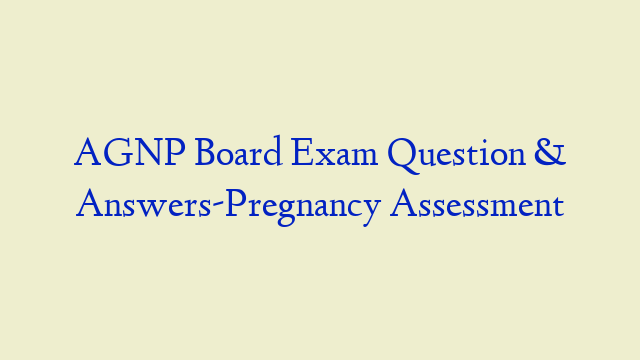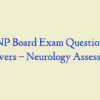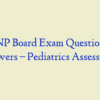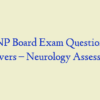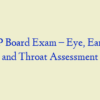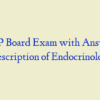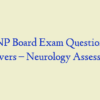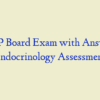Description
AGNP BOARD EXAM QUESTIONS Pregnancy Assessment (67 Questions)
- Weight gain should be monitored during pregnancy. For a pregnant woman whose BMI is < 18.5, the total weight gain should be:
- During pregnancy, which hormone is produced by the placenta and supports progesterone synthesis in the corpus luteum?
- During pregnancy, as the skin over the abdomen stretches to accommodate the fetus, this purplish mark may appear. This finding is:
- When should all pregnant woman be screened for human immunodeficiency virus (HIV)?
- Irregular brownish patches around the forehead, cheeks, nose, and jaw noted during pregnancy are:
- After 24 weeks gestation, auscultation of more than one fetal heart tone (FHT) in different locations with varying rates suggests:
- During pregnancy, which supplement is recommended to decrease the risk of neural tube defect?
- Inaudible fetal heart tones (FHT) may indicate:
- Weight gain should be monitored during pregnancy. For a pregnant woman whose BMI is 25 – 29.9, the total weight gain should be:
- New onset hypertension with proteinuria or end-organ damage is:
- Which one of the following symptoms would be seen in a 39 week gestational age patient who was suspected of having HELLP syndrome?
- During pregnancy, which hormone is secreted by the corpus luteum and placenta to promote ligamentous laxity in the sacroiliac joint and pubic symphysis for passage of the fetus?
- When should an oral glucose tolerance test be performed during pregnancy?
- During pregnancy, a palpable softening of the cervical isthmus is noted. This finding is:
- If fetal movement cannot be perceived after 24 weeks gestation, all of the following may be considered except:
- During pregnancy, which hormone results in increased blood viscosity?
- During pregnancy, if fundal height is 4 centimeters smaller than expected, consider:
- During pregnancy, a patient’s fundal height measured 26 centimeters. This would suggest that the gestational age was:
- In the third trimester of pregnancy, which position affords the greatest comfort by reducing the weight of the uterus on the abdominal vessels?
- The cervical opening or shortening noted during a bimanual examination prior to 37 weeks gestation, may indicate:
- Increased vascularity throughout the pelvis during pregnancy gives the vagina a bluish color. This sign is:
- During pregnancy, dyspnea accompanied by increased respiratory rate, cough, rales, or respiratory distress raises concerns of:
- Inflamed and overgrown gingiva during pregnancy is:
- Adequate daily dietary intake of folic acid in pregnancy is:
- Normal changes in the breast and nipples during pregnancy include all of the following except:
- During pregnancy, which hormone is responsible for increasing insulin resistance and hyperglycemia associated with gestational diabetes?
- Upon cervical examination of the pregnant woman, cervical erosion, erythema, and irritation are noted. These findings could be suggestive of:
- As tension on the abdominal wall increases with advancing pregnancy, the rectus abdominis muscles may separate at the midline of the abdomen. This finding is termed:
- When should a vaginal swab for Group B streptococcus be obtained in a pregnant woman?
- During pregnancy, what sound may be auscultated at the second or third intercostal space at the sternal border due to increased blood flow through the vessels?
- During pregnancy, which hormone increases tidal volume and alveolar minute ventilation, lowers esophageal sphincter tone, and relaxes tone in the uterus and bladder?
- A five percent weight loss during the first trimester due to vomiting would be considered:
- Which of the following is NOT a condition associated with hyperthyroidism in pregnancy?
- Pregnant women should avoid unpasteurized dairy products, such as soft cheese, raw eggs, and delicatessen meats because of the risk of:
- Normal findings of the vaginal wall of a pregnant woman, include all of the following except:
- When performing a pelvic exam on a pregnant woman, a larger speculum may be needed because of:
- A form of milk produced by the mammary glands during late pregnancy is referred to as:
- During the examination of a pregnant woman, knee and ankle deep tendon reflexes appear hyperreflexic. This finding could be suggestive of:
- Hypertension that occurs after 20 weeks gestation in the absence of proteinuria is:
- During pregnancy, the Leopold maneuvers assist in determining all of the following except:
- During pregnancy, if fundal height is 4 centimeters larger than expected, consider all of the following except:
- What is the importance of prenatal care?
- Which of the following sexually transmitted disease (STD) screening tests is NOT routinely recommended during pregnancy?
- When performing the first Leopold maneuver on a pregnant woman, if the fetal buttocks and head are not easily palpated at the fundus, the fetus is said to be in:
- Ingestion of large sea-going fish, such as tuna, swordfish and shark should be avoided in pregnant women, because they contain large amounts of:
- Facial edema in a pregnant woman after 20 weeks gestation, could be:
- The normal fetal heart rate (FHR) range is:
- Which substance used during pregnancy accounts for one third of all low-birth-weight infants, placental abruption, and preterm labor?
- Symptoms on initial assessment of a pregnant woman with preeclampsia are: blood pressure 158/100; urinary output 50 ml./hour; lungs clear upon auscultation; +1 urine protein on dipstick; and edema of the hands, ankles, and feet. On assessment an hour later, which one of the following symptoms would indicate worsening of preeclampsia?
- When examining the pregnant patient, conjunctival pallor may indicate:
- Which substance used during pregnancy accounts for the leading cause of preventable intellectual disability?
- When performing the third Leopold maneuver on a pregnant woman, the fetal head is the presenting part. This finding is referred to as the:
- When might fundal height in a pregnant woman most accurately predict gestational age?
- In pregnant women, between 10 to 18 weeks gestation, fetal heart tones (FHT) can be auscultated along the:
- During the last trimester of pregnancy, the supine position causes the uterus to overlie the vertebral column and compress the descending aorta and inferior venal cava. This position causes the patient to become faint and dizzy resulting in:
- Weight gain should be monitored during pregnancy. For a pregnant woman whose BMI is 18.5 – 24.9, the total weight gain should be:
- When performing the third Leopold maneuver on a pregnant woman, the cephalic prominence is on the same side as the back. This finding is referred to as the:
- What is the standard instrument used to auscultate fetal heart tones?
- If regular uterine contractions occur prior to 37 weeks gestation, this could be:
- During pregnancy, which hormone promotes endometrial growth that supports the early embryo?
- To estimate the expected date of delivery (EDD) using Naegele’s rule, if the last menses was March 3, 2014, the EDD would be:
- When performing the first Leopold maneuver on a pregnant woman, if the fetal buttocks and head are easily palpated at the fundus, the fetus is said to be in:
- Murmurs audible during pregnancy may suggest:
- B/P readings greater than 140 mm HG systolic and greater than 90 mm HG diastolic prior to pregnancy, before 20 weeks gestation, or beyond 12 weeks postpartum is:
- During the vaginal examination of a pregnant woman in her first trimester, an adnexal mass with tenderness is palpated. This finding could be consistent with:
- During pregnancy, a brownish black pigmented vertical stripe along the midline of the abdomen may appear. This finding is:
- Weight gain should be monitored during pregnancy. For a pregnant woman whose BMI is = 30, the total weight gain should be:
